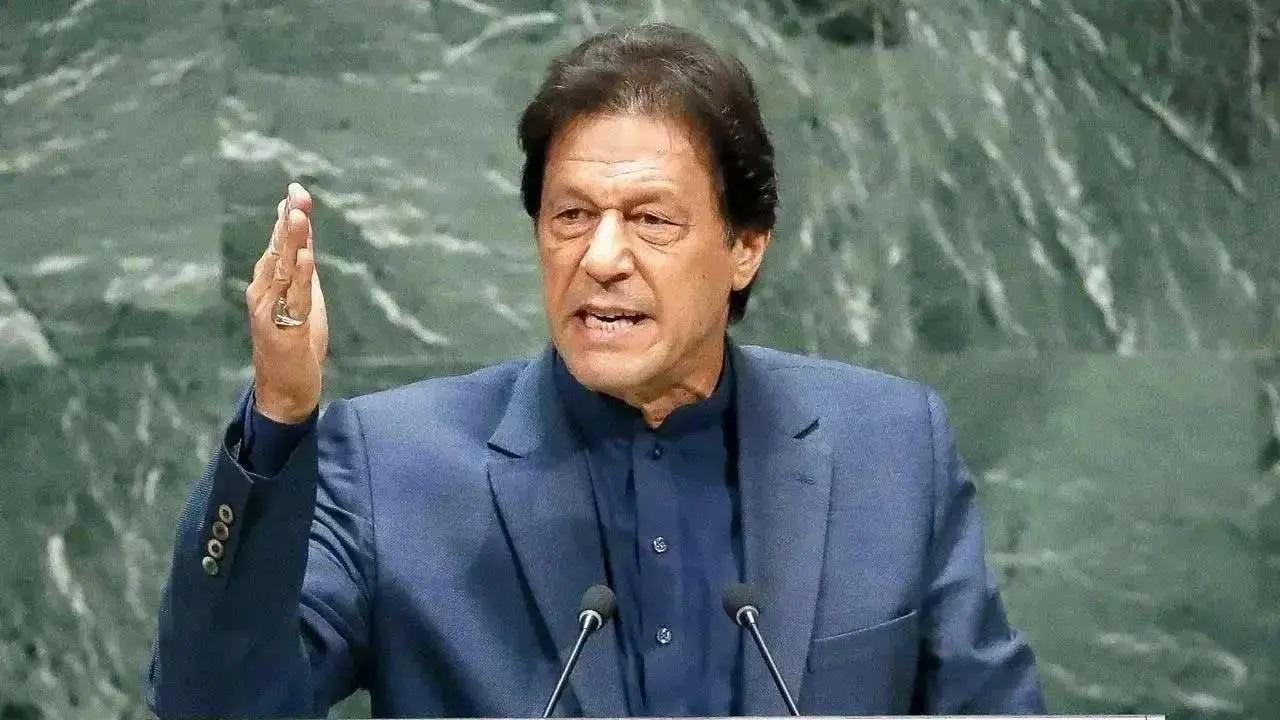Cipher case: Judge Abul Hasnat Zulqarnain, who has been hearing the cases related to the Official Secrets Act, 1923, conducted the proceedings inside the high security Attock Jail where Imran Khan is currently lodged

Imran Khan. File Pic
A special court in Pakistan on Wednesday extended the judicial remand of jailed former prime minister Imran Khan and his close aide Shah Mahmood Qureshi till September 26 in a case related to the alleged disclosure of state secrets.
ADVERTISEMENT
Judge Abul Hasnat Zulqarnain, who has been hearing the cases related to the Official Secrets Act, 1923, conducted the proceedings inside the high security Attock Jail where the 70-year-old former prime minister is currently lodged.
During the in-camera hearing, Judge Zulqarnain extended Khan's judicial remand for another 14 days in the cipher case, his lawyer Naeem Haider Panjotha said in a post on platform X.
"Judicial remand of Chairman PTI Imran Khan extended till September 26," Khan's Pakistan Tehreek-e-Insaf (PTI) party said in a brief message on WhatsApp.
Two-time foreign minister Qureshi was also produced in court on Wednesday following the completion of his 14-day judicial remand. The court also extended Qureshi's judicial remand till September 26.
Qureshi, 67-year-old former foreign minister, was arrested under the Official Secrets Act for violating the secrecy of the official cable sent by the Pakistani embassy in the US to the foreign office when he was the foreign minister.
Security was beefed up outside the jail ahead of the hearing.
Khan has been kept in the Attock Jail since August 5 after his conviction in the Toshakhana corruption case.
His sentence was suspended by the Islamabad High Court (IHC) on August 29, but he continues to remain in Attock prison in the cipher case. Last month, his remand was extended for 14 days till September 13 by the special court.
Today's hearing comes at the end of the 14-day judicial remand.
The cricketer-turned-politician is charged with the violation of the Official Secrets Act in connection with the leakage of a confidential diplomatic cable from Pakistan's embassy in Washington.
On Tuesday, the law ministry issued a notification, expressing no objections to conducting the trial in jail, saying that special court judge requested that proceedings be held in Attock jail "due to security reasons".
The ministry in its notification cited unspecified security issues for allowing hearing in the jail premises.
However, Khan's spokesman Zulfiqar Bukhari rejected the plea and demanded a trial in a normal court environment.
"Hearing continues citing security concerns, a preposterous excuse saturated with malice when there can be video link appearance if not in person," he said in a statement.
Bukhari also said that the authorities had not waited for the outcome of the case heard by the Islamabad High Court (IHC) against Khan's trial in jail.
The IHC on Tuesday reserved its order on a petition against the conduct of Khan's trial in prison, rather than Islamabad.
Chief Justice Aamer Farooq concluded proceedings by saying that he would pass an "appropriate order".
The cipher case was filed last month against Khan on the allegations of violating secret laws of the country in the matter of a cable sent by the Pakistan embassy in Washington in March last year.
In March last year, ahead of the vote of no-confidence that resulted in his ouster, Khan pulled out a piece of paper - allegedly the cipher - from his pocket and waved it at a public rally in Islamabad, claiming it was the evidence of an ¿international conspiracy¿ being hatched to topple his government.
However, during the interrogation with the joint investigation team (JIT) in the jail on August 26, Khan denied that the paper he waved at a public gathering last year was the cipher. He also admitted to losing the cipher, saying he couldn't recall where he kept it.
His principal secretary Azam Khan stated before a magistrate and the FIA that the Khan used it for his 'political gains' and to avert a vote of no-confidence against him.
The purported cipher (secret diplomatic cable) contained an account of a meeting between US State Department officials, including Assistant Secretary of State for the Bureau of South and Central Asian Affairs Donald Lu, and Pakistani envoy Asad Majeed Khan last year.
Of late, Khan has come under increased scrutiny following the publication of a purported copy of the secret cable by the US media outlet The Intercept, with many in the previous government led by Shehbaz Sharif pointing fingers at the PTI chief for being the source of the leak.
Khan, who served as the country's prime minister until April last year, currently faces around 180 cases. These cases primarily stem from incidents that occurred following the sacking of the Lahore corps commander's house on May 9.
 Subscribe today by clicking the link and stay updated with the latest news!" Click here!
Subscribe today by clicking the link and stay updated with the latest news!" Click here!







